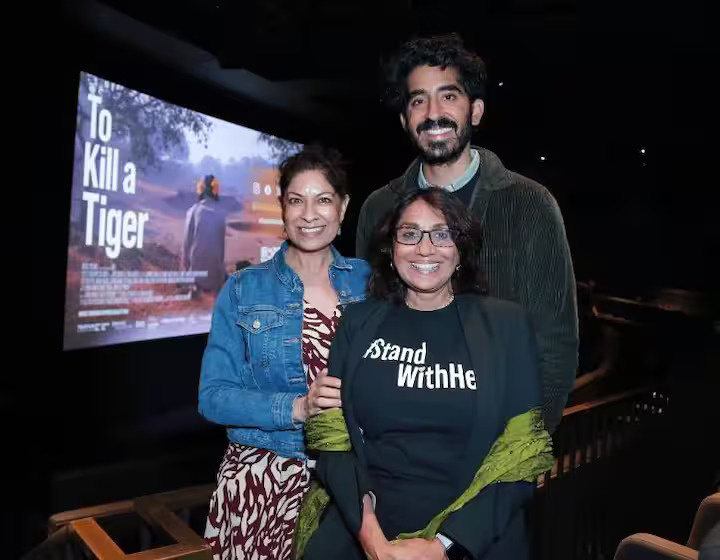(February 1, 2024) When she first started working on the project, Canadian filmmaker Nisha Pahuja’s idea was to make a detailed documentary about the prevalent male chauvinism in India. However, while researching and shooting the documentary in rural Jharkhand, where she followed activists from a local gender equality NGO, the filmmaker met Ranjit, a father seeking justice for his 13-year-old daughter Kiran (a pseudonym), who had been brutally assaulted by three men from their village.

“I was very aware of the sensitivities around the story and the way that it had created friction and a fraying of the threads that keep the community together. And it was an issue that we were not from that community. What we tried to do to mitigate any kind of fallout was to build bridges with the leadership of the village — the ward member, the mukhiya — and also the villagers themselves,” the filmmaker said in a recent interview while speaking about her movie To Kill a Tiger – which was recently nominated in the best feature documentary category for the Oscars 2024.
“I was in shock. I couldn’t believe it. I was over the moon. Yeah, I just couldn’t believe it,” the Global Indian said, talking about her initial reaction when she got to know that her movie was nominated for the top awards, adding, “This film has work to do in the world – Their story, their struggle, their commitment to justice, the fact that as a man, Ranjit stood by his daughter, which is so rare. The film is about the underdog, a David vs. Goliath story, and it’s a film about love.”
Stories that matter
Born in New Delhi, the filmmaker’s family moved to Canada in the early 1970s, where the filmmaker confessed years later that she was bombarded with a new “western lifestyle”. Like many Indians who grew up abroad, Nisha’s childhood was filled with Bollywood movies and music. However, her love for creativity leaned more towards books and literature. Nisha went on to pursue a bachelor’s in English literature from the University of Toronto, to write fiction. And it was here that her life completely changed.

Nisha’s final days at university saw a fateful meeting with producer Geeta Sondhi, leading to her research role on the CBC documentary Some Kind of Arrangement. This experience sparked a love for documentary filmmaking, where she found her passion in amplifying real stories that shed light on larger societal issues. “Real stories attract me. A human being reveals themselves to you in such a profound kind of way. I think I was just really drawn to that, to the idea of real people, real stories, and being able to connect to them,” she said.
After collaborating as a researcher with Canadian filmmakers John Walker and Ali Kazimi, the filmmaker eventually embarked on her own journey in the world of filmmaking. Her 2012 documentary, The World Before Her, explored the complex and conflicting environment for young girls in India by following women participating in the Miss India Pageant as well as girls being trained in the Durga Vahini, the women’s wing of the VHP. While she was a bit apprehensive about the topic eventually, the documentary was quite successful internationally including North America and India.
Motivated by the tragic 2012 Delhi gang rape incident, Nisha took her documentary on a nationwide journey, aiming to make a difference in the realms of women’s rights, as well as address issues such as female foeticide and infanticide. A couple of years later, the filmmaker and her team initiated a four-city tour, collaborating with NGOs and women’s rights organisations. Their objective was to screen the film in underserved communities and engage in profound conversations with diverse audiences. “Change happens in small shifts, often indiscernible, often immeasurable. And sometimes the best way to make that shift is through the simple act of sharing stories,” she said.
Path to glory
After making critically acclaimed and award-winning documentaries, such as Diamond Road, Bollywood Bound, and Being Mortal, the filmmaker wanted to tell a story from the grassroots of India, and that’s how To Kill a Tiger happened. “I’ve been making films in India around gender for quite some time. It’s been a subject that’s been very interesting for me. So, after the Dehli gang rape, I decided that I really wanted to make a film on masculinity and explore why some men become the way they do in that culture,” shared the filmmaker, adding that film took about eight years to make.
While it is true that filmmakers are often in love with their subjects, Nisha shared that she was deeply inspired by Kiran’s courage while she was shooting the film. “She’s so compelling. While I was interviewing her for the documentary, she said, adding, “She watched the film with her parents and she didn’t want to be hidden. She wanted to be celebrated. When I asked her why she chose to come forward in this way, she said it’s because when she watched the film, she couldn’t believe how brave she was. She was so proud of the 13-year-old girl that she loves. And that’s the girl she wants to celebrate.”
Already in search of a new subject, and a new story, the filmmaker is quite hopeful that the movie will win hearts even at Oscars. “I’ll take Ranjit and his daughter to the Academy Awards. They are the reason we are where we are. It’s because of them,” the filmmaker shared.




